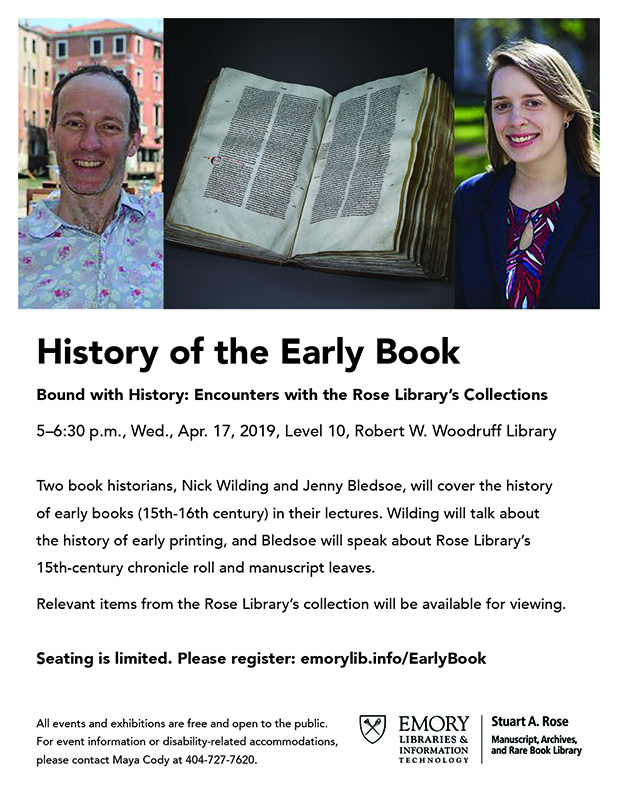Click here to download PDF.
Author Archives: admin
History of the Early Book, April 17, 2019
Check out Emory’s medieval manuscripts and early printed books during this session at the Rose Library. I’ll be speaking about Emory’s chronicle roll, fragmentology, and digital humanities. Register here: http://emorylib.info/EarlyBook

Emory’s Chronicle Roll: Late Medieval History Writing and Sixteenth-Century Nobility
A video of my presentation, “Emory’s Fifteenth-Century English Chronicle Roll: Late Medieval History Writing and Sixteenth-Century Nobility,” is available at this link or in the embedded video below. I gave this paper on March 1, 2019 as part of the Materiality of Devotion exhibit and symposium organized by Sarah Bogue, Emma de Jong, and Kelin Michael at Emory University’s Pitts Theology Library.
At over 22 feet long, Emory’s fifteenth-century chronicle roll manuscript unites biblical, mythical, and royal history. The genealogical diagram and accompanying text begins with the seven days of creation, describes biblical and mythical rulers, and documents the kings (and some queens) of England, extending to Queen Elizabeth I with a sixteenth-century addition. Scholars have only begun to study the Emory roll, but it participates in a tradition of history writing—works known as universal chronicles—popular in the pre-modern world. I have recently discovered that the Emory roll is part of a family of English chronicles, which includes a manuscript owned by the University of Canterbury in New Zealand (digital and physical facsimiles of this roll are on display in the exhibit). After locating the Emory roll within the tradition of universal chronicles and the “Noah family” of manuscripts, the presentation will focus on the work of a later scribe who added a membrane to the Emory roll to update the chronicle to the reign of Queen Elizabeth I. The sixteenth-century scribe documents the marriages of several members of English noble families; this content will frame a discussion of the potential noble patrons and uses for medieval chronicle roll manuscripts.
Emory’s Fifteenth-Century English Chronicle Roll: Late Medieval History Writing and Sixteenth-Century Nobility from Candler School of Theology on Vimeo.
March 1 Symposium (The Materiality of Devotion: From Manuscript to Print)
Premodernists in the Atlanta area, please take note of this symposium on March 1 at Emory’s Pitts Theology Library. Come see some of Emory’s medieval manuscripts and early printed books, and, if you’re so inclined, hear me talk about “Emory’s Fifteenth-Century English Chronicle Roll: Late Medieval History Writing and Sixteenth-Century Nobility.” The program, including abstracts, for the symposium is available here. The full announcement below includes more details and the link to register.
In conjunction with our Materiality of Devotion: From Manuscript to Print exhibition, Pitts Theology Library is pleased to invite you to a one day symposium based around the objects and themes of that exhibition. The event will include seven speakers from Emory and the greater Atlanta community, representing the fields of conservation, art history, medieval and early modern history, and the history of all three Abrahamic religions.
The symposium will begin with a keynote address by Dr. Lynley Herbert, Associate Curator of Rare Books and Manuscripts at the Walters Art Museum. Dr. Herbert’s talk on Fragmentary Manuscripts will examine all that goes into making a book, particularly the complexities inherent in dealing with dismantled books. How do art historians go about solving the puzzle of single leaves? Come to the talk to find out!
Thanks to generous funding from the Mellon Humanities PhD Intervention Program and the Laney Graduate School New Thinkers/New Leaders Program, there will be no cost to attend this event! You are more than welcome to attend individual sessions or the full day, but please help us plan for your needs by filling out the formbelow, with particular attention to the two meals and any dietary restrictions you might have. The deadline for registering to participate in these two meals is February 21.
Register at this link: https://form.jotform.com/90216037909154
CFP, Kalamazoo ICMS 2019 (deadline: Sept. 10, 2018)
Or click here to download PDF.
Atlanta Journal-Constitution op-ed, November 15, 2017
Read my op-ed about how the proposed tax bill would limit access to graduate education, especially for those students who are not independently wealthy.
Opinion: Only wealthy can afford grad school under House tax plan up for vote today
Jenny C. Bledsoe is a fifth-year Ph.D. candidate in English at Emory University, specializing in medieval literature. She was featured in a New York Times story last week that examined how the GOP House tax plan would impact a range of American students.
New York Times article, November, 11 2017
MLAgrads guest post, November 7, 2017
On MLAgrads (the website of the Modern Language Association’s Committee on the Status of Graduate Students in the Profession), read my guest post on the potential effects of the proposed tax bill on humanities education, including humanities graduate students as well as the undergraduate students they teach.
GOP Tax Bill Would End Higher Education as We Know It
Guest blog post by Jenny C.
Kalamazoo 2018: Session announcement
With Ashley J. Laverock (Savannah College of Art and Design), I have organized a special session on interdisciplinary approaches to the hagiographies of St Margaret of Antioch for the 2018 International Congress on Medieval Studies at Kalamazoo.
Multi-faceted Margarets: Textual and Visual Hagiographies of Saint Margaret of Antioch
“The Earliest Cult of Saint Margaret of Antioch in Hungary”
Dorottya Uhrin, Eötvös Loránd University
“Multiple Marinas, Confusing Iconographies: Saint Marina the Monk and Saint Marina of Antioch in Thirteenth- to Sixteenth-Century Italy and Spain”
Andrea-Bianka Znorovszky, Trivent Publishing
“Critical Fiction: Reading Seinte Marherete through Robyn Cadwallader’s The Anchoress”
Karen A. Winstead, Ohio State University

